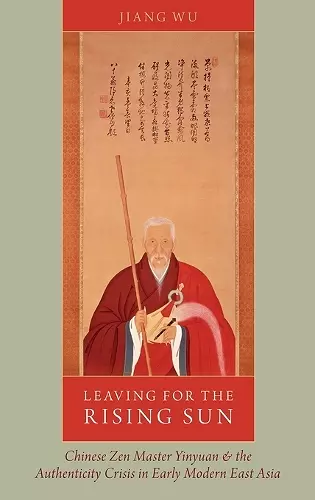Leaving for the Rising Sun
Chinese Zen Master Yinyuan and the Authenticity Crisis in Early Modern East Asia
Format:Hardback
Publisher:Oxford University Press Inc
Published:15th Jan '15
Currently unavailable, and unfortunately no date known when it will be back
This hardback is available in another edition too:
- Paperback£39.49(9780199393138)

In 1654 Zen Master Yinyuan traveled from China to Japan. Seven years later his monastery, Manpukuji, was built and he had founded his own tradition called Obaku. The sequel to Jiang Wu's 2008 book Enlightenment in Dispute: The Reinvention of Chan Buddhism in Seventeenth-Century China, Leaving for the Rising Sun tells the story of the tremendous obstacles Yinyuan faced, drawing parallels between his experiences and the broader political and cultural context in which he lived. Yinyuan claimed to have inherited the "Authentic Transmission of the Linji Sect" and, after arriving in Japan, was able to persuade the Shogun to build a new Ming-style monastery for the establishment of his Obaku school. His arrival in Japan coincided with a series of historical developments including the Ming-Qing transition, the consolidation of early Tokugawa power, the growth of Nagasaki trade, and rising Japanese interest in Chinese learning and artistic pursuits. While Yinyuan's travel has been noted, the significance of his journey within East Asian history has not yet been fully explored. Jiang Wu's thorough study of Yinyuan provides a unique opportunity to reexamine the crisis in the continent and responses from other parts of East Asia. Using Yinyuan's story to bridge China and Japan, Wu demonstrates that the monk's significance is far greater than the temporary success of a religious sect. Rather, Yinyuan imported to Japan a new discourse of authenticity that gave rise to indigenous movements that challenged a China-centered world order. Such indigenous movements, however, although appearing independent from Chinese influence, in fact largely relied on redefining the traditional Chinese discourse of authenticity. Chinese monks such as Yinyuan, though situated at the edge of the political and social arenas, actively participated in the formation of a new discourse on authenticity, which eventually led to the breakup of a China-centered world order.
In this wonderfully informative study, Jiang Wu extends the significance of his previous, groundbreaking book, Enlightenment in Dispute, from China into the greater East Asian sphere of the seventeenth and eighteenth centuries. Through the career and legacy of the eminent monk Yinyuan Longqi (1592-1673) in China and Japan, Wu penetrates the crisis of cultural legitimacy that beset East Asia, particularly Tokugawa Japan, after the demise of the Ming dynasty. * Lynn Struve, Professor of Chinese History, Indiana University, Bloomington *
ISBN: 9780199393121
Dimensions: 163mm x 236mm x 28mm
Weight: 717g
384 pages